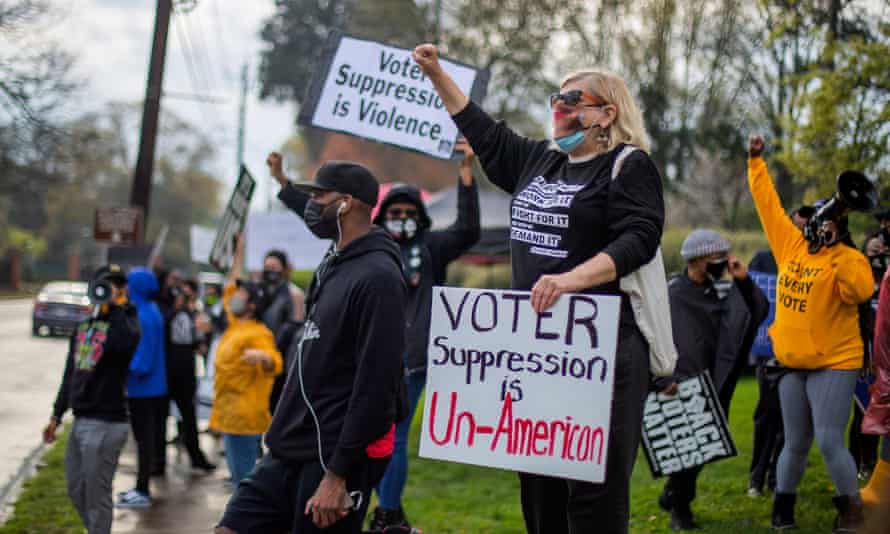Extract from The Guardian
President says new law represents ‘blatant attack on the constitution’ as voting rights activists vow to keep up the fight.

Protesters outside the governor’s mansion in Georgia on Thursday. The 98-page measure significantly curtails access to the ballot in the state.
Last modified on Sat 27 Mar 2021 06.56 AEDT
Joe Biden lambasted a new law in Georgia that imposes sweeping new voting restrictions, calling it “un-American” and “Jim Crow in the 21st century”.
He said in a statement: “Instead of celebrating the rights of all Georgians to vote or winning campaigns on the merits of their ideas, Republicans in the state instead rushed through an un-American law to deny people the right to vote. This law, like so many others being pursued by Republicans in statehouses across the country, is a blatant attack on the constitution and good conscience.”
Activists in Georgia vowed on Friday to keep up an aggressive campaign to pressure Republicans over their support for the measure, saying they were undeterred by its final passage through the legislature.
Several more lawsuits are expected in the coming days.
The 98-page measure significantly curtails access to the ballot in the state. It imposes new ID requirements for mail-in voting, limits the availability of ballot drop boxes, gives voters less time to request and return a mail-in ballot, and bars providing food or water to people standing in line to vote. The law also gives the state legislature, currently controlled by Republicans, the authority to appoint a majority of the state election board while also creating a pathway for the board to take over local boards of elections. Those boards make critical decisions on a range of issues, like poll closures and challenges to voter qualifications.
“We are filing this lawsuit for one simple reason: SB 202 should be classified as a violation of voting rights. It is a violation of our dignity and our power,” Nse Ufot, chief executive of the New Georgia Project, said in a statement. “Georgia’s Black, Brown, young and new voters are here to stay. We will organize, knock on doors and show up to the polls 10 times over. And we will fight for solutions and progress for all Georgia voters.”
“They’re changing laws based on lies,” said Helen Butler, the executive director of the Georgia Coalition for the People’s Agenda, who has worked for decades in helping to increase voter turnout among voters of color in the state.
Ronna McDaniel, the chair of the Republican National Committee, which recently launched a new effort to coordinate new restrictive voting laws, offered a full-throated defense of the measure on Friday. She pointed to a provision on the bill that expands early voting hours on the weekends to argue that the measure overall made it easier to vote.
“Democrats can lie and spin about the bill all they want, but the real question should be: why are Democrats so terrified of a transparent and secure election process? We look forward to defending this law in court,” she said.
Deborah Scott, the executive director of Georgia Stand-Up, a civic action group, was rallying against the bill outside the state capitol in Atlanta on Thursday when she found out it passed the general assembly. Hours later, she was at a rally outside the headquarters of Delta, one of several companies activists are pressuring to oppose the bill, when she found out the legislature gave it final approval. She said her group and others would continue to pressure companies to take a stand.
“It’s making our blood hot,” Scott said. “It’s also uniting Black and brown communities of color all across Georgia. It’s uniting women. I know it’s really about power and they see people of color gaining power in southern states like Georgia.”
Park Cannon, a Democratic representative in the state house of representatives, was arrested on Thursday evening as she knocked on the door to Kemp’s office while he was signing the bill. Activists and Senator Raphael Warnock rallied outside the Fulton county jail when she was released late on Thursday.
“Today is a very sad day for the state of Georgia,” Warnock said. “What we have witnessed today is a desperate attempt to lock out and squeeze the people out of their own democracy.”

Brian Kemp, second right, who signed the bill into law on Thursday. Photograph: Alyssa Pointer/AP
“If they won’t let us give them water at the polls, we’ll make sure they have water before they get to the polls. We’re just going to find a way or make one,” Scott said. “We’re resilient. We have survived slavery. We have survived the first Jim Crow and we’ll definitely survive Jim Crow in a seersucker suit in 2021.”
One provision in the law moves up the application deadline for an absentee ballot to 11 days until election day (voters previously had until the Friday before election day to request). In 2020, there were 17,602 absentee ballots cast that resulted from applications submitted 11 days before election day, according to an analysis by Fair Fight, a voting rights group started by former Democratic gubernatorial candidate Stacey Abrams. Black voters comprised about 37% of the ballots returned during that period, compared with 30% of all absentee ballots submitted.
Richard Barron, the elections director in Fulton county, home of Atlanta, said the law would increase lines at the polls both during early voting and election day. Barron noted his county had used 38 ballot drop boxes in 2020, but now would have to get rid of all but eight. The new law only allows for one drop box for every 100,000 voters and only allows election officials to place them inside early voting sites and keep them open during early voting hours.
“The drop boxes have essentially been rendered useless,” he said. The bill also blocks Barron from again using two mobile voting buses, which the county spent more than $700,000 on.
The bill also shortens the runoff election period from nine weeks to just four, with no guarantee of weekend early voting, which Black voters disproportionately use. Republicans won every statewide runoff race in Georgia between 1992 and 2021, when they lost two US Senate runoff elections. The shorter runoff period, Barron said, would make it harder to get mail-in ballots out to voters.
Republicans who pushed the bill have said it is needed to increase confidence in the election process. Several recounts of the 2020 race showed there was no evidence of fraud.
“What are the parts of the bills that are supposed to increase confidence? That would be my question. I don’t see anything in the bill that does that,” he said.
.png)
No comments:
Post a Comment